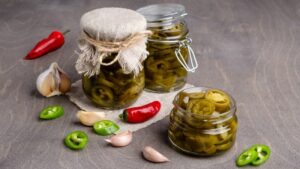Spicy cayenne pepper adds a kick of flavor and heat to dishes. But some wonder if regularly eating cayenne could harm your liver. Let’s explore whether cayenne pepper causes liver damage or if it actually has some health benefits.
Recent research indicates that cayenne pepper contains beneficial compounds that may support liver function rather than damage it. The key is moderation. Used appropriately, cayenne pepper can be part of a liver-healthy diet.
How Cayenne Pepper Affects Your Liver
The liver performs over 500 vital functions. It filters toxins, regulates blood sugar, stores nutrients, and produces bile to digest fats. Keeping your liver healthy is crucial.
So what effects does the spicy compound in cayenne called capsaicin have on the liver?
Anti-Inflammatory Effects
Inflammation damages liver cells and contributes to serious conditions like hepatitis or cirrhosis. Capsaicin displays anti-inflammatory properties that help reduce liver inflammation.
Antioxidant Protection
Cayenne’s antioxidants fight cell-damaging free radicals caused by oxidative stress. This helps prevent liver cell death.
Fat Breakdown
Animal studies show cayenne pepper may aid fat metabolism and prevent fatty buildup in the liver. This could help counter non-alcoholic fatty liver disease (NAFLD).
Positive Liver Function
Human research indicates that consuming cayenne pepper generally improves liver function blood tests.
Evaluating the Research on Cayenne Pepper and Liver Health
Early research suggests cayenne pepper has hepatoprotective effects shielding the liver from harm. But more studies are still needed to draw definitive conclusions. Here’s what we know:
- Mice given cayenne showed less liver fibrosis and reduced activation of hepatic stellate cells involved in scarring.
- Rats fed cayenne, ginger, and garlic had improved antioxidant levels and less diet-induced oxidative stress.
- Capsaicin seems to increase metabolic rate and fat burning which may help prevent fatty liver disease.
- Cayenne appears to stimulate bile production which is essential for the liver to digest fats and eliminate toxins.
- No major risks have been observed in human studies using culinary doses of cayenne pepper.
While promising, keep in mind these are preliminary findings. Consult your doctor before using cayenne pepper supplements for liver health.
Is Cayenne Pepper Good for Your Liver? Benefits and Risks
Used appropriately, cayenne pepper adds flavor and nutrition without liver damage. But certain risks need to be considered:
Benefits
- Anti-inflammatory properties protect liver cells
- Antioxidants prevent cell death from oxidative stress
- May aid fat metabolism and prevent fatty liver
- Stimulates bile production to improve digestion
Potential Risks
- Can aggravate reflux, ulcers, and other GI issues
- May interact with certain medications
- High doses linked to liver toxicity in animals
- Not recommended for children under 25 years old
To stay safe, use cayenne pepper as an occasional culinary
How to Safely Add Cayenne Pepper to Your Diet
Follow these tips to incorporate cayenne pepper without harming your liver:
- Use sparingly – Cayenne pepper is very potent, so a little goes a long way. Limit to 1⁄4-1⁄2 teaspoon per meal.
- Combine with healthy fats – Pairing cayenne with avocados, olive oil, or nuts helps minimize GI irritation.
- Drink plenty of fluids – Cayenne pepper can be dehydrating. Drink extra water and herbal tea.
- Watch for reactions – If you experience abdominal pain, heartburn, or nausea, stop using cayenne.
- Buy high-quality – Opt for organic cayenne pepper from a reputable source. Avoid fillers or additives.
- Talk to your doctor – Get personalized guidance on using cayenne pepper based on your health conditions and medications.
Other Ways to Support Liver Health Naturally
Along with a nutritious diet, these evidence-based natural remedies can help keep your liver healthy:
- Milk thistle – This herb aids detoxification and provides antioxidant support. Take 250 mg per day.
- Turmeric – Curcumin, the active compound in turmeric, reduces inflammation and protects liver cells.
- Coffee – Studies show 2-3 cups per day is linked to lower risk of liver disease. Opt for organic to avoid pesticide exposure.
- Beetroot juice – Nitrates in beets boost nitric oxide levels, which aids liver detoxification. Drink 2 ounces daily.
- Walnuts – Eating walnuts helps prevent NAFLD thanks to their omega-3 fatty acids and antioxidant content.
- Berries – The anthocyanins in berries protect the liver from free radical damage. Eat fresh or frozen blueberries, raspberries, and blackberries daily.
The Takeaway: Cayenne Pepper’s Effects on Your Liver
Preliminary research indicates cayenne pepper and its active component capsaicin may benefit liver health when used moderately. Its antioxidant, anti-inflammatory, and fat-burning effects show potential to protect the liver and prevent disease.
However, high doses of cayenne are not recommended, especially for those with digestive issues or taking certain medications. Minor culinary amounts added to a balanced diet are unlikely to cause harm. Talk to your doctor about whether incorporating cayenne pepper is appropriate based on your individual health profile and liver function.
While more studies are still needed, cayenne pepper can be a safe addition to a liver-healthy lifestyle when used wisely. Combined with other nourishing foods and natural remedies, cayenne may help keep your liver strong for years to come.





